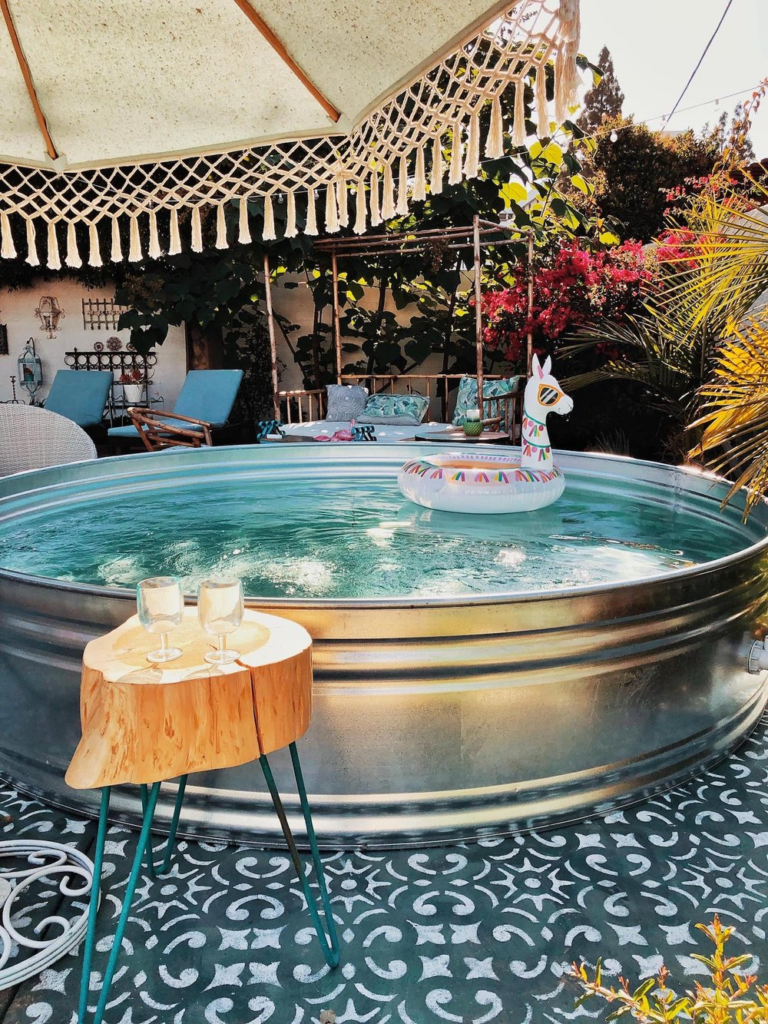
Hey yall! Have you been daydreaming about taking a refreshing dip in your very own swimming pool, but the thought of draining your wallet is making you hesitate? Well, fear not, my frugal friends, because I’m about to introduce you to a world of pool ideas on a budget, that won’t break the bank!
Get ready to dive into the realm of backyard pool ideas on: inflatable pools, stock tank pools, and above-ground pools. These fantastic alternatives to the pricey in-ground pools will have you splashing in joy without worrying about draining your savings. So, sit back, relax, and let me guide you through the exciting realm of Inexpensive Swimming Pool Ideas For Your Backyard.
Together, we’ll explore their price ranges, uncover the pros and cons, and help you find the perfect pool that’ll make your summer truly epic!
(This post may contain commission affiliate links. It comes at no additional cost to you if you choose to make a purchase and helps me continue providing you with free content.)
Tips To Consider Before Deciding On A Swimming Pool
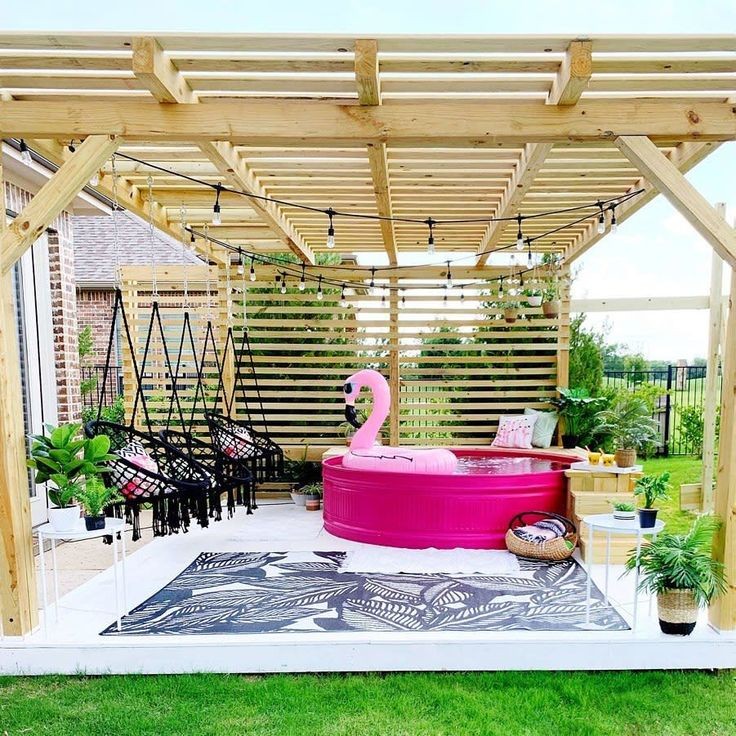
Prior to deciding on a pool, the first thing I recommend is deciding on your primary reasons for wanting a pool. Are you looking for a temporary solution for a few seasons, a more permanent feature, or something in between? Understanding your needs and priorities will help you determine which type of pool aligns best with your vision.
Definitely define your budget for the pool, including any additional costs such as installation, maintenance, accessories, and ongoing expenses. If you’re planning to DIY, consider cost for tools or for assistance should you need it. Inflatable pools generally tend to be the most affordable option, followed by stock tank pools and above-ground pools. Be realistic about what you can comfortably afford without regrets.
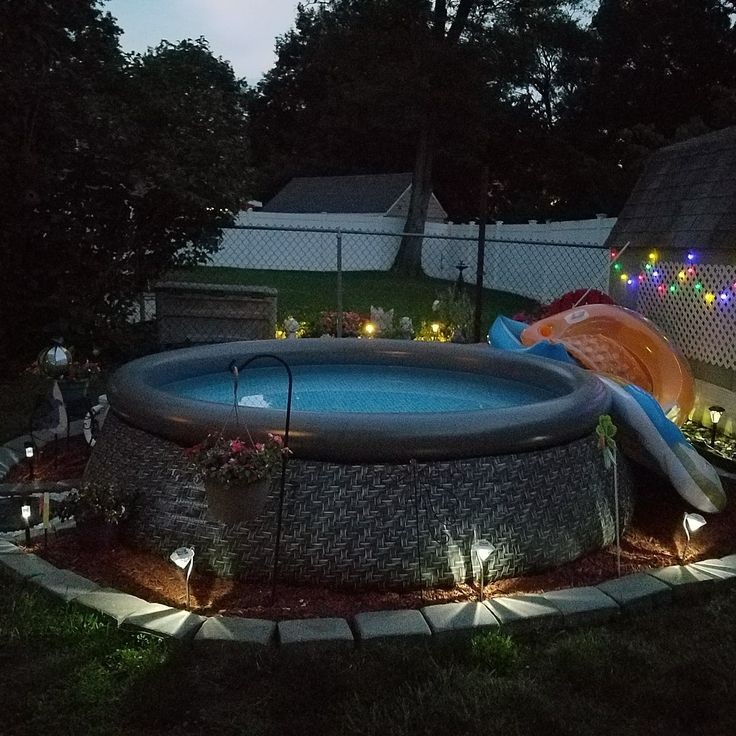
Assess the available space in your backyard. Inflatable pools are the most flexible in terms of space requirements, as they come in various sizes and can fit smaller areas. Stock tank pools and above-ground pools require more space, so ensure you have enough room for installation.
Consider durability and longevity keeping in mind the weather where you live Inflatable pools are the least durable option, with a shorter lifespan compared to stock tank or above-ground pools. Stock tank pools are typically made of galvanized steel or plastic, while above-ground pools are constructed with materials like resin or steel. Assess the durability and longevity of each option and weigh it against your long-term plans.

Lastly, my least favorite part is deciding on your commitment with the maintenance and upkeep. In-ground pools generally require more maintenance and ongoing expenses compared to the other options. Above-ground pools also require regular maintenance, including cleaning, chemical balancing, and filtration. Inflatable pools and stock tank pools may have simpler maintenance requirements but still require regular cleaning and water treatment.
Consider local regulations and permits: Check local regulations and permits required for installing and operating different types of pools in your area. Some jurisdictions may have specific requirements or restrictions that could impact your decision.
Inflatable Pools Price Range Plus Pros And Cons
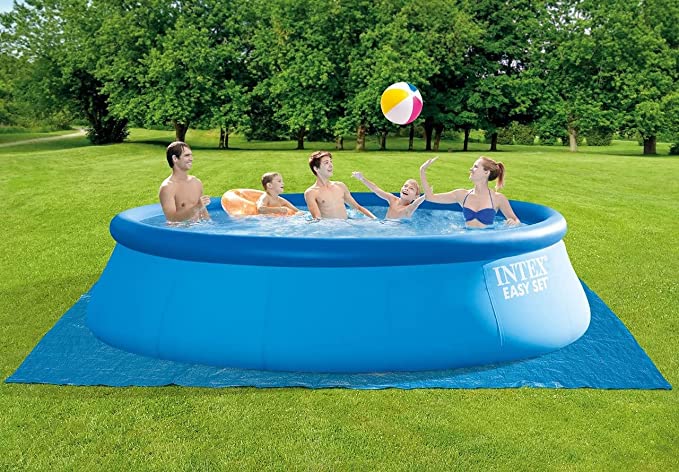
Inflatable Pool Pricing Including Installation
Inflatable Pool Pricing Including Installation: $40 – $900
Inflatable pools are affordable options that can be easily set up and taken down. They come in various sizes and shapes to fit your backyard space. Inflatable pools are so affordable, that you can have multiple versions, perhaps various animals shapes to throw your own Zoo Pool party.
Inflatable Pool Pros
Affordability: Inflatable pools are generally more affordable than permanent pools. They are a cost-effective option for those who want to enjoy a pool experience without investing in a more expensive installation.
Easy installation and storage: Inflatable pools are easy to set up and deflate, making them convenient for temporary use. They can be quickly inflated and filled with water when desired, and easily stored when not in use.
Portability: Inflatable pools are portable and can be moved to different locations within your backyard or even taken to a different location if needed. This flexibility allows you to adapt the pool placement based on your preferences or changing outdoor needs.

Quick assembly: Inflatable pools can be set up in a matter of minutes, requiring minimal construction or excavation. This makes them a great option for renters or those who don’t want a permanent pool structure.
Variety of sizes and designs: Inflatable pools come in a wide range of sizes, shapes, and designs, allowing you to choose one that fits your available space and meets your needs. From small wading pools for children to larger family-sized pools, there are options to suit different preferences.
Inflatable Pool Cons
Limited durability: Inflatable pools are not as durable as permanent pools. They are susceptible to punctures, tears, and damage from sharp objects, pets, or rough play. Repairing or replacing the pool may be necessary if it gets damaged.
Limited lifespan: Inflatable pools typically have a shorter lifespan compared to permanent pools. The materials used in inflatable pools may degrade over time due to exposure to sunlight, chemicals, and repeated use.
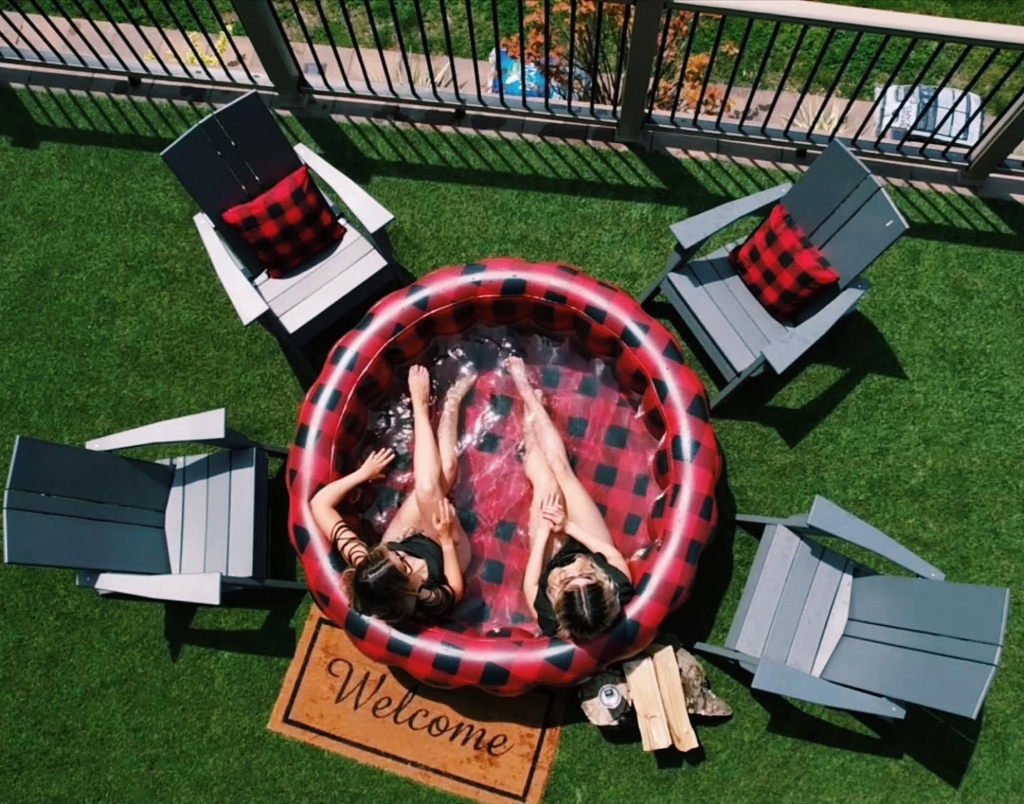
Water maintenance: Like any pool, inflatable pools require regular maintenance and water treatment to ensure water quality and safety. This includes regular cleaning, monitoring chemical balance, and proper filtration. However, inflatable pools may have smaller filtration systems, which can require more frequent cleaning and maintenance.
Limited depth and space: Inflatable pools are often shallower and have limited space compared to permanent pools. This can restrict certain activities, such as diving or swimming laps, and may not provide as much room for multiple people to enjoy simultaneously.

Safety concerns: Inflatable pools may have limited safety features compared to permanent pools. They may not have built-in steps or ladders, and precautions should be taken to ensure the pool is used safely, especially for children and non-swimmers.
Consider these pros and cons when deciding whether an inflatable pool is the right option for your backyard. It’s important to assess your specific needs, available space, budget, and long-term plans before making a purchase. Additionally, familiarize yourself with any local regulations and safety guidelines related to inflatable pools in your area.
Stock Tank Pool Price Range Plus Pros And Cons
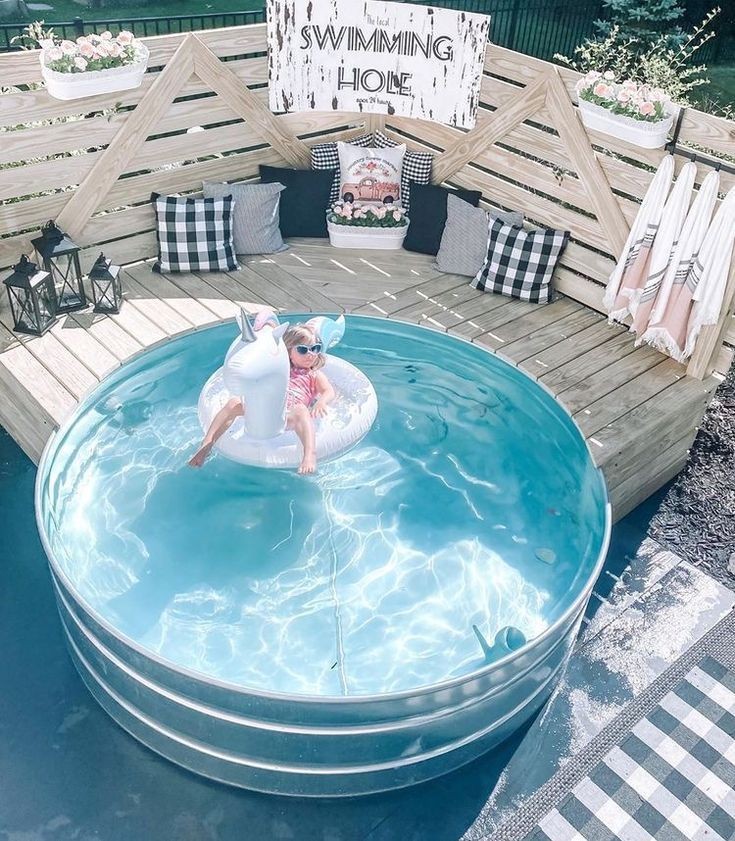
Stock Tank Pool Pricing Including Installation
Price Range Including Professional Or DIY Installation: $200 – $1900
Stock Tank Pool Pros
Stock tank pools: Repurposing a large stock tank (typically used for watering livestock) can make for an inexpensive pool option. They are durable, easy to maintain, and can be fitted with a pool filter and pump.
Stock tank pools have become increasingly popular as an affordable and versatile alternative to more expensive traditional in-ground or above-ground pools.
There are absolutely many Pros to buying and owning a Stock Tank Pool. I’ll also be sharing some Cons as well.

Stock tank pools are relatively inexpensive compared to conventional pools, making them a budget-friendly option for those seeking a refreshing water feature within a short period of time.
Your Stock Tank Pool can be delivered within 2-8 weeks depending on your location and the vendor. Once delivered, installation takes just a few hours and can by DIY by the owner versus hiring professional assistance.

Stock tank pools are portable and can be moved or repositioned if desired. This flexibility allows you to adapt the pool placement based on your preferences or changing outdoor needs.
Stock tank pools are space efficient, designed in various sizes, so you can choose one that fits the available space on your property. They are particularly suitable for smaller yards, balconies, or patios.
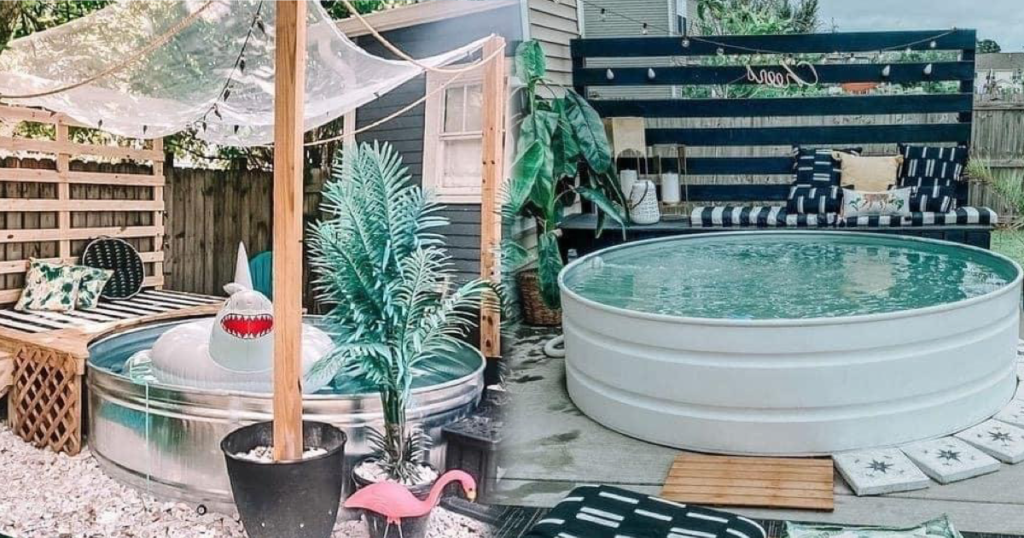
Personal customization is another perk when going with a stock tank pool. You can paint or decorate the tank, add seating or shade structures, and incorporate various accessories to enhance the pool’s aesthetics and functionality.
Another advantage is stock pools can be used for more than just swimming. They can serve as a relaxing soak tub, a rain water collector for your garden during the off season months, or even a container for aquatic plants or fish.
Stock Tank Pool Cons
Does size really matter? Stock tanks are smaller in size compared to traditional pools, so if you have specific swimming or exercise needs, the compact size may not be suitable for you. Additionally, the depth of stock tank pools is typically limited, which may restrict certain activities.

Keep in mind, there is a lack of filtration and heating with stock tank pools. Stock tanks do not come with built-in filtration or heating systems. While you can add aftermarket options, these additional costs can add up, and the maintenance and operation may be more involved compared to standard pool equipment. Maintaining water quality can be more challenging. Regular monitoring, chemical balancing, and manual cleaning are necessary to keep the pool water safe and clear.
There is also the unpredictable durability concerns. Some stock tanks are not designed specifically for long-term use as swimming pools. They may be more prone to wear and tear, rusting, or degradation over time, depending on the quality of the tank and the materials used. Using a liner can prevent it from rusting in the covered area and I would advise on asking the merchant how often should the exterior be treated to prevent rust as well.
Above Ground Pools Price Range Plus Pros And Cons

Above Ground Pool Pricing Including Installation
Price Range Including Installation: $1,850 to $5,000
Above Ground Pool Pros
Above-ground pools are generally more affordable than in-ground pools. They require less construction, excavation, and landscaping, resulting in lower overall costs.
Above-ground pools are relatively easy to install, and many can be assembled without professional assistance. They typically come in kits with detailed instructions, making the process more manageable.
Above-ground pools can be disassembled and relocated if needed. This flexibility allows you to take the pool with you if you move or change your outdoor living space.

Above-ground pools can offer increased safety compared to in-ground pools, especially for households with young children or pets. They are more difficult for unsupervised access, reducing the risk of accidents.
Above-ground pools come in various shapes and sizes, allowing you to choose one that fits your available space and aesthetic preferences. They can be customized with accessories like decks, steps, and fencing to enhance functionality and appearance.

Above Ground Pool Cons
Above-ground pools generally have a shorter lifespan compared to in-ground pools. They are typically made of materials like steel, resin, or vinyl, which may degrade over time and require replacement or repair.
Some people find the appearance of above-ground pools less visually appealing compared to in-ground pools. They can be seen as less integrated into the overall landscape and may not have the same level of sophistication.
Above-ground pools tend to be smaller and shallower compared to in-ground pools. If you have specific swimming or exercise needs, the size and depth limitations of above-ground pools may not meet your requirements.

Like any pool, above-ground pools require regular maintenance and cleaning to ensure water quality and safety. This includes balancing chemicals, cleaning the pool walls and floor, and maintaining the filtration system.
Above-ground pools often lack some of the features and amenities found in in-ground pools, such as built-in spas, waterfalls, or diving boards. Adding these features to an above-ground pool can be challenging or costly.
It’s important to carefully consider your specific needs, budget, available space, and long-term plans before deciding to buy and own an above-ground pool. Additionally, familiarize yourself with any local regulations and permits required for installation and operation in your area.
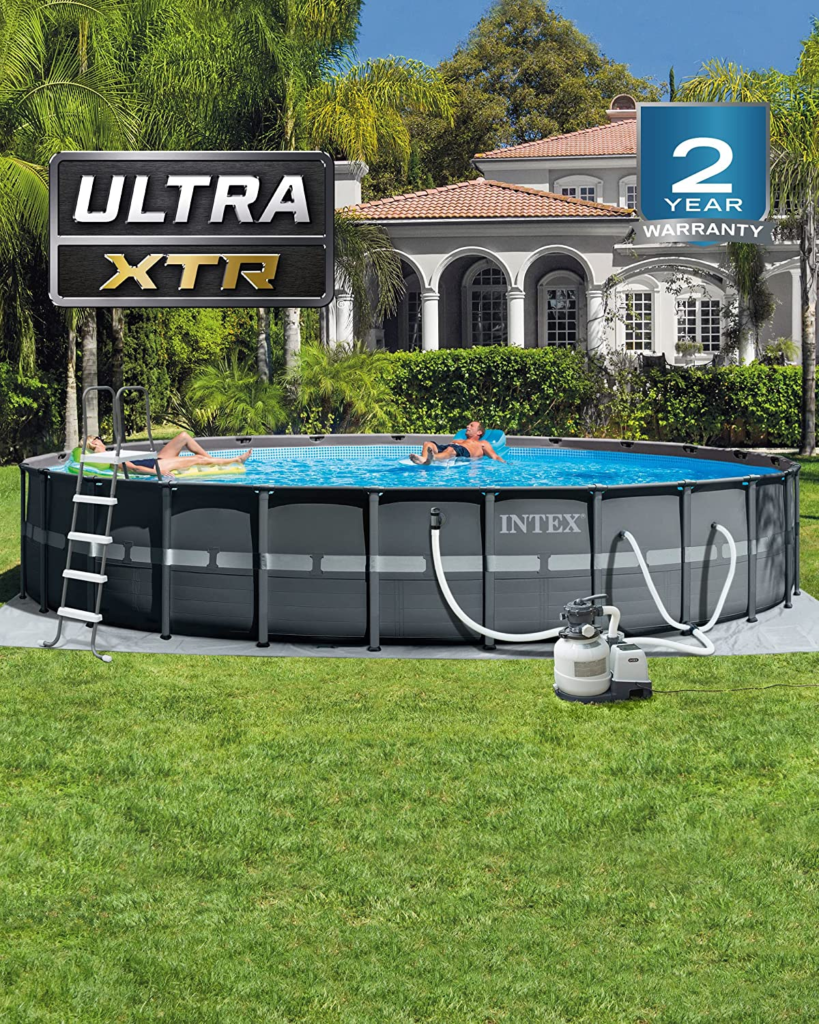
DIY natural swimming pools: Natural swimming pools mimic the look and function of a traditional pool but use plants and a biofilter instead of chemicals. While building a natural pool may require some initial investment, it can be a cost-effective and eco-friendly option in the long run.
Intex or similar brand pools: Intex is a popular brand that offers affordable above-ground pools in various sizes. They are easy to set up, come with a filter pump, and are more durable than inflatable pools.
DIY pallet pool: With some creativity and DIY skills, you can build a pool using wooden pallets. Simply line the pallets with a waterproof liner and seal the joints. It’s a budget-friendly option that allows customization.

Temporary pool rentals: Some companies offer temporary pool rentals, where they bring in a pool structure and set it up for a specific duration. This can be a convenient and affordable option if you want a pool for a limited time, such as for a summer party or event.
Community or public pools: Check if there are any community or public pools in your area that offer affordable membership or day pass options. This way, you can enjoy a pool without the need for one in your backyard.
Important Final Thoughts And Other Options To Consider When Buying A Pool
Before deciding on a pool, be sure to check local regulations and permits required for installing and operating a stock tank pool in your area. Some jurisdictions may have specific requirements or restrictions regarding pool installations. Some HOA’s (including mine) do not allow above ground backyard pools which have a above ground deck or ladder overlooking the next door neighbor’s yard.
With any pool consider accessibility and safety. They typically do not have built-in safety features like ladders or fences, so it’s important to consider how you will address safety concerns, especially if you have children or pets. Remember to consider safety measures, such as installing a fence or pool cover, and always adhere to local regulations and guidelines regarding pool installation and usage.
Explore used or discounted options: Consider looking for used or discounted pools, especially for stock tank pools or above-ground pools. You may find deals on classified ads, online marketplaces, or local pool supply stores. Just ensure you thoroughly inspect the condition and quality of the used pool before making a purchase.
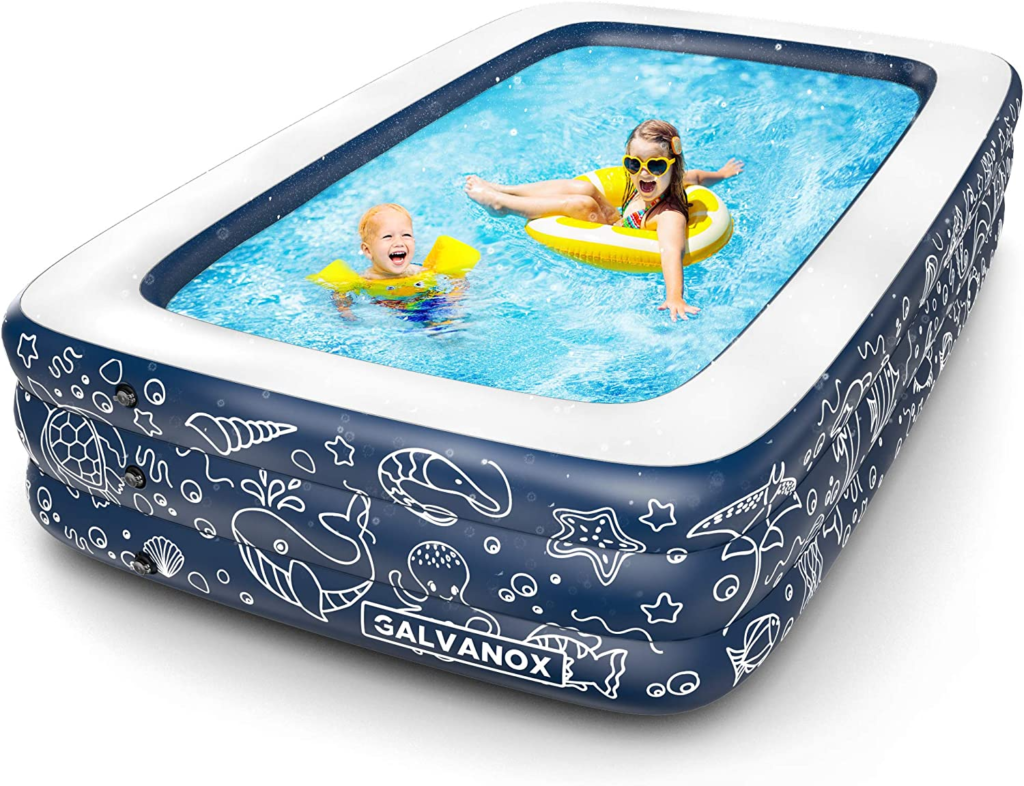
Research reviews and recommendations: Read reviews and seek recommendations from others who have experience with the type of pool you’re considering. This can provide insights into the pros, cons, and overall satisfaction with different pool options.
By carefully considering these factors and doing thorough research, you can make an informed decision on the type of pool that best fits your budget, space, and preferences while still providing an enjoyable water feature for your backyard.
Conclusion: Inexpensive Swimming Pool Ideas For Your Backyard, plus Pros and Cons
That is all yall, my dear readers, a wild and watery adventure through the realm of inexpensive swimming pool ideas for your backyard. We’ve swam through the pros and cons, dodged the waves of potential regret, and emerged with a splashing array of options for all budget-conscious water enthusiasts.
I want to express my sincerest gratitude for your endurance in reading Inexpensive Swimming Pool Ideas For Your Backyard. Without your commitment, my words would be floating aimlessly in the vast ocean of cyberspace. Now, go forth and make a splash, dear friends, armed with the knowledge that can transform even the most humble backyard into a water wonderland. And remember, when life gives you budget limitations, just dive right in and make a cannonball-sized splash of creativity.
Happy swimming, and may your summers be filled with laughter, sunscreen, and the echoes of joyful splashing!
XoXo
Katt Tu`Lani
![]()